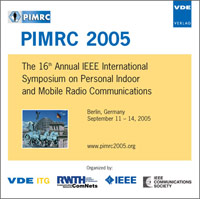Breaking Through AMR Voice Capacity Limits due to Dropped Calls by Control Channel Improvements in GERAN Networks
Conference: PIMRC 2005 - 16th Annual IEEE International Symposium on Personal Indoor and Mobile Radio Communications
09/11/2005 - 09/14/2005 at Berlin, Germany
Proceedings: PIMRC 2005
Pages: 6Language: englishTyp: PDF
Personal VDE Members are entitled to a 10% discount on this title
Authors:
Ivanov, K.; Ball, C. F.; Müllner, R. (Siemens AG, Communications Mobile Networks, St.-Martin-Str. 76, 81541 Munich, Germany)
Winkler, H.; Perl, R.; Kremnitzer, K. (Siemens AG, PSE, Gudrun Str. 11, 1101 Vienna, Austria)
Abstract:
During the last couple of years a series of voice quality and capacity enhancement features have been implemented in narrow-band deployments of GERAN (GSM/EDGE Radio Access Networks) mobile radio networks. Recent field findings revealed Call Drop Rate (CDR) to be the major limiting factor already in medium loaded AMR (Adaptive Multi Rate) networks planned in tight frequency reuse due to excessive failures on the associated control channels (ACCH). The reason for this phenomenon observed at 20% to 30% EFL (Erlang Fractional Load) is the significant link level performance imbalance of up to 6 dB (in terms of C/I) between AMR 4.75 / 5.90 kbps voice codecs and signaling ACCH. In this study a novel strategy based on temporary ACCH overpower has been proposed as a practical and fully backwards compatible option to reduce the C/I gap and to improve the probability of successful decoding of the FACCH/SACCH frames. A full description of the CDR contributors (Radio Link Timeout and Handover Failures) has been provided along with detailed system level simulation results. The initial evaluation of the novel approach is very promising, showing a significant soft capacity gain by substantially reducing CDR allowing a system load well above 30% EFL in homogeneous hexagonal networks. The suggested approach could be efficiently combined with current 3GPP standardization initiatives for control channel improvements in GERAN.


